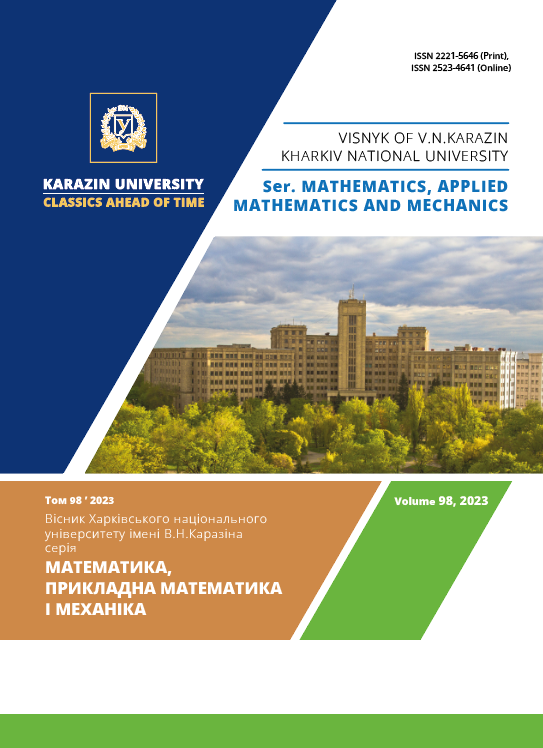On linear stabilization of a class of nonlinear systems in a critical case
Abstract
In this paper, we address the stabilization problem for nonlinear systems in a critical case. Namely, we study the class of canonical nonlinear systems. Canonical nonlinear systems or chain of power integrators is an important subject of research. Studying such systems is complicated by the fact that they cannot be mapped onto linear systems. Moreover, they have the uncontrollable first approximation. Previous results on smooth stabilization of such systems were obtained under the assumption that the powers in the right-hand side are strictly decreasing. In this work, we consider a case of non-increasing powers in the right-hand side for a three-dimensional system. A popular approach for studying such systems is the backstepping method, which is a method of step-wise stabilization. This method requires a sequential investigation of lower-dimensional subsystems. Backstepping enables the study of a wide range of nonlinear triangular systems but requires technically complex and cumbersome computations. Therefore, a natural question arises about constructing stabilizing controls of a simple form. Polynomial controls can serve as an example of such controls. In the paper, we demonstrate that linear controls can be considered as stabilizing controls. We derive sufficient conditions for the coefficients of the linear control that ensure the asymptotic stability of the zero equilibrium point of the corresponding closed-loop system. The asymptotic stability is proven using the Lyapunov function method, which is found as the sum of squares. The negative definiteness of the Lyapunov function derivative in a neighborhood of the origin guarantees asymptotic stability. In contrast to the case of strictly decreasing powers, additional conditions on the control coefficients, apart from their negativity, emerge. The obtained result extends to a broader class of nonlinear systems through stabilization by nonlinear approximation. This allows the consideration of systems with higher-order terms in the right-hand side. The effectiveness of the applied approach is illustrated by several model examples. The method used in this work to investigate the case of non-increasing powers can be applied to systems of higher dimensions.Downloads
References
M.O. Bebiya and V.I. Korobov, On Stabilization Problem for Nonlinear Systems with Power Principal Part, Journal of Mathematical Physics, Analysis, Geometry. - 2016. - Vol. 12, No. 2. - P. 113-133. DOI: https://doi.org/10.15407/mag12.02.113
V.I. Korobov and M.O. Bebiya, Stabilization of one class of nonlinear systems, Automation and Remote Control. - 2017. - Vol. 78, No. 1. - P. 1-15. DOI: https://doi.org/10.1134/S0005117917010015
J. Zhu, C. Qian, A necessary and sufficient condition for local asymptotic stability of a class of nonlinear systems in the critical case, Automatica. - 2018. - Vol. 96. - P. 234-239. DOI: https://doi.org/10.1016/j.automatica.2018.06.052
M.O. Bebiya, Stabilization of Systems with Power Nonlinearity, Visnyk of V.N. Karazin Kharkiv National University, Ser. Mathematics, Applied Mathematics and Mechanics. - 2014. - Vol. 69, No. 1120. - P. 75-84.
W. Lin, C. Qian, Adding one power integrator: A tool for global stabilization of high order lower-triangular systems, Systems and Control Letters. - 2000. - Vol. 39, No. 5. - P. 339-351. DOI: https://doi.org/10.1016/S0167-6911(99)00115-2
W. Lin, C. Qian, Robust regulation of a chain of power integrators perturbed by a lower-triangular vector field, Int. J. Robust Nonlinear Control. - 2000. - Vol. 10, No. 5. - P. 397-421. DOI: https://doi.org/10.1002/(SICI)1099-1239(20000430)10:5%3C397::AID-RNC477%3E3.0.CO;2-N
X. Wang, Z. Xiang, Global finite-time stabilisation of high-order nonlinear systems: a dynamic gain-based approach, International Journal of Systems Science. - 2019. - Vol. 50, No. 8. - P. 1677-1687. DOI: https://doi.org/10.1080/00207721.2019.1622814
M. Li, J. Guo, Z. Xiang, Global adaptive finite-time stabilization for a class of p-normal nonlinear systems via an event-triggered strategy, Int J Robust Nonlinear Control. - 2020. - Vol. 30, No. 10. - P. 4059-4074. DOI: https://doi.org/10.1002/rnc.4983
X. Wang, Z. Xiang, Global finite-time stabilisation for a class of nonlinear systems in the p-normal form via output feedback, International Journal of Systems Science. - 2020. - Vol. 51, No. 9. - P. 1604-1621. DOI: https://doi.org/10.1080/00207721.2020.1772398
N. Wang, C. Qian, Z.-Y. Sun, Global asymptotic output tracking of nonlinear second-order systems with power integrators, Automatica. 2017. - Vol. 80. - P. 156-161. DOI: https://doi.org/10.1016/j.automatica.2017.02.026
Copyright (c) 2023 Maxim Bebiya, Vladyslava Maistruk

This work is licensed under a Creative Commons Attribution-NonCommercial-NoDerivatives 4.0 International License.
The copyright holder is the author.
Authors who publish with this journal agree to the following terms:
1. Authors retain copyright and grant the journal right of first publication with the work simultaneously licensed under a Creative Commons Attribution License that allows others to share the work with an acknowledgement of the work's authorship and initial publication in this journal. (Attribution-Noncommercial-No Derivative Works licence).
2. Authors are able to enter into separate, additional contractual arrangements for the non-exclusive distribution of the journal's published version of the work (e.g., post it to an institutional repository or publish it in a book), with an acknowledgement of its initial publication in this journal.
3. Authors are permitted and encouraged to post their work online (e.g., in institutional repositories or on their website) prior to and during the submission process, as it can lead to productive exchanges, as well as earlier and greater citation of published work (see The Effect of Open Access).




